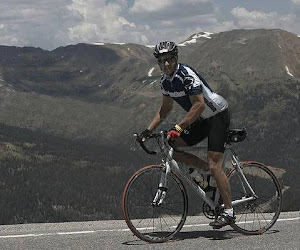The new buzz-words or phrase in cycling right now seems to be- "the Next Level". Everyone is talking about how to get to the Next Level. Even my mentor, Hunter Allen, recently wrote a blog/bit on his interpretation of it. In short, what Hunter believes is holding cyclists back from getting to the "Next Level" is their Functional Threshold Power (or watts). For me, I believe that's half of it. I believe the other half is their Weight (or kgs). Therefore, it's the w/kg (pronounced watts per kg or power to weight ratio) that is holding cyclists back. That is why if you follow my blogs, on a regular basis, you'll see that half of my blogs are related to power and the other half are related to nutrition/dieting.
I'm pretty sure every serious cyclist knows what their FTP should be in order to reach the "Next Level". If not, I highly recommend you get an FTP test. Email me the results, I will tell you if your power is enough to reach the Next Level. (BTW, I perform FTP tests routinely on my Lab Quality Computrainer for $75, $50 for the athletes I coach and FREE thereafter for coached athletes). But what about your body weight? Do you know what your optimal body weight should be for your height, age, sex, event, etc.? Will losing 10 lbs make you a better climber? Would gaining 10 more lbs (of muscle mass) make you a better sprinter or give you more endurance? According to Matt Fitzgerald, author of "Racing Weight" (for endurance athletes), surveys at the Society for Behavioral Medicine in Montreal, Canada and published in the Annals of Behavioral Medicine revealed that 74% of respondents (that were endurance athletes) labled themselves as "concerned or very concerned" about their body weight. So, it's just NOT the pros that are concerned. (I think the other 26% were either VERY lean athletes or didn't understand the value of optimal body weight and its affect on sports performance.) I share the concern of the 74% because I know the importance..especially for cycling performance.
So, how do you compute your optimal body weight? Unfortunately, there isn't a weight test that I know of (unlike an FTP test for measuring power) for determining your optimal body weight. But, there is a formula derived by Matt Fitzgerald (see below), that will compute your optimal body weight if you know your current body fat percentage and optimal body fat percentage. (BTW, the average bodyfat for a competive male cyclist ranges from 5% to 15%. Elite/Pro athletes average between 5-10% and recreational athletes between 10-15%.) If you're of the less-scientific mindset, and don't feel like determining your body fat percentage, there is a simpler method- like looking at a full-length mirror with your speedo on...for FREE. I'm serious, that's all you need. One look at those love handles, double chin, protruding gut, fat a$$, etc. will tell you that you need to lose weight. If you look in the mirror and see what looks like a skeleton with skin wrapped around it..chances are you need to gain a few pounds of muscle.
Here's how Matt Fitzgerald, author of "Racing Weight", computes optimal body weight:
a. weigh yourself in lbs.
b. determine your current body fat percentage and subtract this number from from 100. Multiply this number by your weight in a.
c. Take the number in b. and divide it by your optimal lean body mass percentage. This is your new optimal body weight.
For me (and my current goal weight):
175 lb. (current) bodyweight x (100%-16% body fat)= 147
147/(.88 lean body mass)= 167 lbs (optimal body weight)
Note: I use the skin-fold caliper method for determining body fat percentage.
So, you want to get to the "Next Level"? Then, up the power and lower the weight (to your optimal body weight) to maximize your power to weight ratio. Power ON! Coach Rob
Wednesday, February 9, 2011
Subscribe to:
Post Comments (Atom)





No comments:
Post a Comment